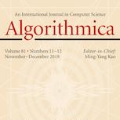Motivated by recent works on streaming algorithms for constraint satisfaction problems (CSPs), we define and analyze oblivious algorithms for the Max-$k$AND problem. This generalizes the definition by Feige and Jozeph (Algorithmica '15) of oblivious algorithms for Max-DICUT, a special case of Max-$2$AND. Oblivious algorithms round each variable with probability depending only on a quantity called the variable's bias. For each oblivious algorithm, we design a so-called "factor-revealing linear program" (LP) which captures its worst-case instance, generalizing one of Feige and Jozeph for Max-DICUT. Then, departing from their work, we perform a fully explicit analysis of these (infinitely many!) LPs. In particular, we show that for all $k$, oblivious algorithms for Max-$k$AND provably outperform a special subclass of algorithms we call "superoblivious" algorithms. Our result has implications for streaming algorithms: Generalizing the result for Max-DICUT of Saxena, Singer, Sudan, and Velusamy (SODA'23), we prove that certain separation results hold between streaming models for infinitely many CSPs: for every $k$, $O(\log n)$-space sketching algorithms for Max-$k$AND known to be optimal in $o(\sqrt n)$-space can be beaten in (a) $O(\log n)$-space under a random-ordering assumption, and (b) $O(n^{1-1/k} D^{1/k})$ space under a maximum-degree-$D$ assumption. Even in the previously-known case of Max-DICUT, our analytic proof gives a fuller, computer-free picture of these separation results.
翻译:暂无翻译



